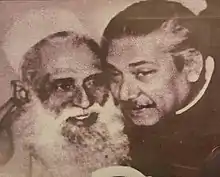Sheikh Lutfar Rahman
Sheikh Lutfur Rahman (Bengali: শেখ লুৎফর রহমান; 1881 – 30 March 1975) was a serestadar, an officer responsible for record-keeping at the Gopalganj civil court in British India.[1] His son Sheikh Mujibur Rahman was the founder of Bangladesh.[2] Lutfar was a religious Muslim.[3] He was also the paternal grandfather of the Sheikh Hasina.[4][5]
Sheikh Lutfar Rahman | |
|---|---|
শেখ লুৎফর রহমান | |
 Sheikh Lutfar Rahman with his son Sheikh Mujibur Rahman | |
| Born | 1881 |
| Died | (aged 94) |
| Nationality | British Indian (1881-1947) Pakistani (1947-1971) Bangladeshi (1971-1975) |
| Occupation | Court officer |
| Known for | Father of Sheikh Mujibur Rahman |
| Spouse(s) | Sheikh Sayera Khatun |
| Children |
|
| Parent(s) |
|
| Family | Sheikh-Wazed family |
Early life
Rahman was born to Sheikh Abdul Hamid in 1881. He was married to his paternal first-cousin Sheikh Sayera Khatun, the daughter of his father's brother Sheikh Abdul Majid. He left home to find a job and worked in the Dewani court, today Gopalganj civil court.[6]
1971 Liberation War
During the Bangladesh Liberation War, Lutfar Rahman and his wife Sheikh Sayera Khatun, along with the family of Sheikh Mujibur Rahman were put under arrest by the Pakistan Army. Initially, Lutfar Rahman and his wife were in Khulna at their younger son Naser's house in Khulna, but was later sent away to their ancestral home in Gopalganj. On 8 April 1971, the Pakistan Army looted ornaments and other valuables from the house and later bulldozed and set fire to it. The soldiers also shot dead four relatives and two servants of the household. The elderly couple were rendered homeless until the local Awami League activists built them a temporary shed which was also destroyed by the Pakistan Army after 20 days. They were then sent away to Dhaka where they were put under arrest with their elder son's family.[7]
Death and legacy
Rahman died on 30 March 1975.[4] He was buried in Tungipara, Gopalganj district, Bangladesh.[8] Sheikh Lutfar Rahman Bridge over Madhumati River connecting Gopalganj-Pirojpur Highway.[9] The foundation stone of the bridge was laid on 23 December 2000 by Sheikh Hasina. The construction was stopped in 2001 by the Bangladesh Nationalist Party and Jammat-e-Islami government. The construction work resumed in 2009 when Bangladesh Awami League returned to power in 2009. The bridge was inaugurated in January 2015 by Sheikh Hasina.[10] Sheikh Lutfar Rahman Adarsha Government College is a government college in Kotalipara, Gopalganj.[11]
Descendants
References
- Tripathi, Salil (2016). The Colonel Who Would Not Repent: The Bangladesh War and Its Unquiet Legacy. Yale University Press. p. 59. ISBN 978-0-300-21818-3.
Sheikh Lutfur Rahman, was an official in the district's civil court.
- "PM attends milad for her grandfather Sheikh Lutfar Rahman". Daily Sun. Retrieved 7 September 2017.
- Rahman, Sheikh Mujibur (1 June 2012). Sheikh Mujibur Rahman: The Unfinished Memoirs. Penguin UK. ISBN 9788184757033.
- "Bangabandhu's father remembered". bdnews24.com. Retrieved 7 September 2017.
- "42nd death anniv of Sheikh Lutfur Rahman today". The Daily Observer. Retrieved 7 September 2017.
- "Early life of Bangabandhu Sheikh Mujibur Rahman". The Independent. Dhaka. Retrieved 7 September 2017.
- Women on the March, Volumes 15-16. Smt. Mukul Banerjee for the Women's Department, 1971. 1971. pp. 1971/18.
- "Bangabandhu Sheikh Mujibur Rahman | The Asian Age Online, Bangladesh". The Asian Age. Retrieved 7 September 2017.
- "Sheikh Lutfar Rahman Bridge opens to vehicular movement". The Financial Express. Dhaka. Retrieved 7 September 2017.
- "PM to inaugurate Sheikh Lutfur Rahman Bridge in Tungipara". Dhaka Tribune. Retrieved 7 September 2017.
- "Kotalipara Upazila - Banglapedia". en.banglapedia.org. Retrieved 7 September 2017.
